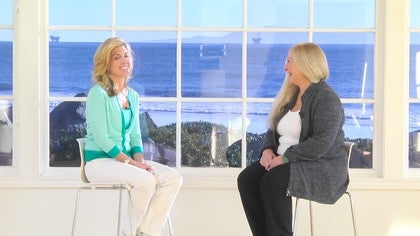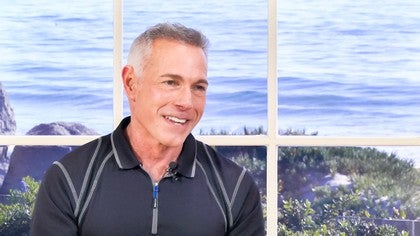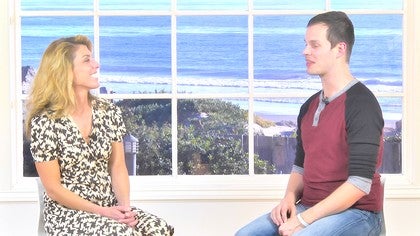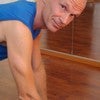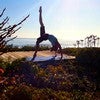Description
If you are interested in learning more about the Trademark Lawsuit, you can read the Court Decision for a detailed report of what was discussed during the trial.
About This Video
Transcript
Read Full Transcript
Chapter 1
Introduction: When Deborah Met Carola Trier and Began to Study Pilates
It is my privilege and honor to be speaking with Deborah lessen in the studio today. Debra has been teaching philosophies for over 30 years. She is a direct link to first-generation teacher Corolla tree here. She was the codefendant in the infamous politeness trademark lawsuit. She's had a studio on green street studios and [inaudible] in New York since 1983 and was instrumental in the beginning of the plays method Alliance.
So thank you for coming and welcome to plays anytime. It's my pleasure to be here. Thank you so much for inviting me. It's been a long time wishing line and there's so much to ask. So let's just start at the beginning. Why don't you tell us first, uh, how you got started in ballets and how came to be that you met Corolla and work?
And I happened to hurt myself in class one day at the Graham school. And my teacher, who was the director of the school, pulled me aside and said, if you would like to continue dancing for a long time, you should do something for yourself. And I said, what? And she said, Paul Addis. So I happened to know two dancers that taught for Corolla and that's why I chose to go there, even though I didn't know what they did, what Palladio's was or who Corolla was. This was 1980 and I realized when I went to Corollas and heard the sound of the Springs that I actually lived over a Pilati studio for six and a half years at that time. Uh, no, previously I did not know what it was, but it was Robert Fitzgerald studio. And having lived in that neighborhood, Midtown Manhattan for that number of years, I had no idea that there were Pilati studios dotting the neighborhood.
Take us into Corolla studio your first day. Well, I arrived at the door. It was a Corolla studio was on 58th street and seventh Avenue in a doorman building. And when I rang the doorbell, she opened the door. She was beautifully groomed, beautiful silver, very done hair and red fingernails and lipstick and European charm. And she always called you, uh, miss Christie. Yes. And she welcomed you in. And, um, I was very charmed by her and she always gave the first session, which started with an introduction where she would put you into your ideal vertical alignment and then introduce you to pull out this breathing and put you on the apparatus and then go when she answered the telephone, that was when you really got the introduction.
And what she would say was, I do the work of the late Joseph [inaudible]. It is full body range of motion exercise on specially designed equipment against resistance, which is presented through Springs. Uh, that's great. And so in the first session she didn't necessarily say that to you cause you were already there, but that is how she presented in it. Yes. And Corolla introduced concepts immediately like breathing.
That's the first thing that, that you did. She sat you down on the reformer, she had you hang your body forward, she put her hands over your back. Uh, where are you, where are your gills would be if you were a fish. And she had you inhale into her hands and exhale and she would describe it like the movement of bellows, you know, pulling air in and pushing air out. And she also talked about, uh, opening your back, like you were opening doors as you were flexing your spine and opening doors in the front of the spine as you were extending. So you, you, uh, learned movement already with this concept in mind.
But I found Palladio's to be very akin to Graham technique and I immediately felt at home in the movement. I think I had been a client for maybe two months when Corolla started asking me if I would teach. And I had already quite a number of years of teaching experience, uh, in Graham technique. So I was, I was accustomed to teaching and I really didn't know what was happening with my career at the time. So I stalled for about a year and then finally said, what, what else am I doing that's so important? And I said, okay, I'll teach. So you want to you as a client? Oh yes. Okay.
And clients had to attend a minimum of two sessions a week. What kind of training did you have to do in order to be a teacher? There was a process. It was old fashioned,
And eventually I was allowed to teach one exercise and then two exercises and then three exercises. And she would choose the clients that I could assist, but there was always another teacher available and supervising until eventually I was competent to work on the floor. Who is some of the teachers that were in the studio at that time? Well, the, the two teachers that I knew who actually had already left were Carrie Roland and Moshay Austra Ghana. And when I started there was a wonderful man named, uh, dealio Ferraro who had also worked for Robert Fitzgerald. Um, he's no longer with us, but he was a wonderful teacher.
And Judy Coleman, who currently lives in West Texas and teaches ballet. And in the afternoon,
So I knew that Romana was calling Kathy grant was calling asking Corolla, do you have any teachers and teacher? Because they were already teaching elsewhere at this time. They had their own studios and everyone always needed teachers. The situation, the first time that I actually heard of any kind of formal training program was friendly hen who had worked for Corolla for a number of years and then opened her own studio. And I think she was so tired of having to train new teachers that she developed this idea of having them sign a contract that she would train them, but they had to stay for two years.
It was successful because they would at least stay for two years. Yeah. Wow. Um, at this point, you know, when you're early teaching in the studio, what did you know about just a place? I knew nothing about him. There was a photograph of him, the famous photograph of Joe and Clara sitting on a bench looking chirpy at each other. Uh, that was on the wall in the studio. And Corolla would talk about Joe and Clara from time to time, but I had no sense of who they were, where they were, what the timeline was. Um, every few months Corolla would, would pull some of the teachers together and go through some of the exercises that we did not do regularly with the idea that she didn't want them to get lost headstand, the more difficult ones. Um, those were not done regularly in the studio, but she felt that anything that she learned from Joe should be carried on even if just for a memory.
She was a very dynamic little fireball. She was extremely well educated, knowledgeable about the body. She could list all of your soft tissue and bones in Latin. She had studied very extensively. She, um, developed some of her own protocols for injuries in areas where PyLadies didn't address them well enough for post rehabilitation. Um, and she was very, very confident.
Well, first of all, she worked hand in hand with several orthopedists. They knew what exercise protocols she was doing with their patients. And I think the relationship of having done that over many years, she was confident that she was healing, not hurting clients. Yes, she was a dancer. She had several injuries.
But the last one is what brought her to Dr. Henry Jordan, who was the chief of orthopedics at Lenox Hill hospital in New York. And Dr. Jordan turned out to be a friend of Joseph [inaudible] and sent Corolla to Mr. Paul [inaudible] for re rehabilitation for her knee injury. Karola stayed with Joe for 10 years and I'm, I don't know for sure, but I'm assuming that she went daily or at least three times a week because that's what people did in those days. Um, and I know that she had a very close relationship with, with both Joe and Clara and, um, there are some photographs of her exercising up at Joe's cottage in the Berkshires with Joe.
Hmm. And if you go back and read return to life, Joe says you have to exercise daily to reap the benefits. What did she do other than teach? Well, she loved dance. She loved dancers. She loved everything having to do with dance. She had many dance clients and so she did go to performances frequently. Um, she had a number of friends.
Some of them were friends from Europe. Uh, she went to museums. She was active in Jewish culture and she always took the month of August off when she was younger. She went back to Germany where she was from and spent a month at Bodden Bodden. Uh, when I worked for her, she started going to Saratoga Springs and, uh, Mohonk mountain house, I don't know. Well, they're closer to New York. They didn't require a trip to Europe, but that was part of her lifestyle.
And she was an avid reader and theater goer. Well of course she introduced me to Paul [inaudible] and I found that things that would take me months to work on in the structure of a dance class I could accomplish in a couple of weeks in a palati studio. So of course a lot of that is taking the, removing weight bearing and being able to identify proper muscle use. So, you know, I was so thankful to learn this, that it was unbelievable. And when I met Corolla and started teaching, I thought, I'm gonna stay here as long as I am learning from her.
And at that point I thought this could last for some time. How long did it, um, it lasted for three years. It could have lasted longer, but in those years Corolla was really slowing down, not feeling well herself. Um, and then I started, uh, becoming aware of certain things in the work that I felt needed to be modernized. Um, at that time there was no term neutral spine. Ah, but I was coming to the thinking that, you know, working flat back rounding under all the time was certainly not what I needed as a dancer. And I didn't see it working for a lot of the clients either. So at a certain point, Corolla confronted me about it and I knew that it was time for me to go. I would have liked to learn more from, but I didn't feel that it was, it was going to happen and I was already on a trajectory and I needed to go.
I wound up teaching there. I immediately poured myself into learning how to teach this form that that was new to me and I really didn't explore outside of that box. So it wasn't until, um, doing research for the trademark cancellation that I learned about Joseph [inaudible]. And, um, I have to take that back. Previously, when I started hearing about, uh, somebody wanting to own the name Paul [inaudible], that sort of raised hairs and I met Kathy grant at that time and I started wanting to know who other [inaudible] teachers were that had nothing to do with Corolla. Um, and, and then I started being aware of this much larger, uh, map of politeness.
And she said, absolutely not. I don't want to have anything to do with any legal proceeding or court proceeding before we go into that. Cause that's a big subject is what did you learn from Corolla that you value most today? Discipline. I had discipline as a dancer and I understood discipline as a dancer. I never, um, imagined how that would cross over into exercise.
And it's something that I see lacking in a lot of [inaudible] now the repetition, the discipline of doing a practice, it's not entertainment, it's not medical intervention. It's exercise. So when you say repetition, you mean that that people are not doing enough repetition. Is that, is that right? Yeah. Um, and of course this, this is a very general statement. Of course it's not, not everyone sure, but you know it at the palati studios, at that time you learned a sequence of exercises and you repeated that sequence. And over time you may learn more things, you may drop some things out if they became repetitious with, with other new exercises that you learnt. But the core exercises in [inaudible] you do every session.
What was a typical day like in the studio? Who was there? When did you work out? Were you just learning? Were, how many clients did you see? Just a typical day in the studio?
And um, Corolla really did not feel well in the afternoons and she tended to get very cranky mid-afternoon. So after a while, uh, I would say after the first year I was brave enough to say, you can lie down if you feel like it. And she would, and she would leave me alone in the studio. So there, there was a regular group of afternoon clients, um, all kinds of people. There was the lovely woman, her curl was editor from green Willow books who encouraged Corolla to write the children's book exercise. What it is, what it does. Um, there were a couple of high school students, there were a bunch of a school of American ballet students. Um, the studio in general was much more active in the morning and that's not when I worked.
So I had to do it first and then I would get on the equipment and within 15 or 20 minutes the cleaner would come and I would get ushered out the door. So that was quite frustrating because I knew that Corolla was on the equipment at six o'clock in the morning.
Chapter 2
Trademark Lawsuit
Um, as a matter of fact, there were very few PyLadies teachers that considered it a career. It was not a career track. Most of the people that I worked with taught, uh, because it was a much better job than waiting on tables. Um, and not that they were good or bad at it, they just weren't serious about it as a future. Um, when I started teaching on my own, I got very serious about it.
I earned a living doing it and it was about 10 years after I started my studio that I started hearing rumblings about someone saying that they owned the name [inaudible] and w w that person was going to try to stop other people from using the name.
Well, he was alive and he really wanted a man to take over and really thought that his exercise regime was designed for men.
In 1992 I heard that Sean Gallagher was going to make a presentation at the I Adams conference in New York international association of dance medicine specialists. And in fact there was a panel on PyLadies moderated by Elizabeth Larkam. Um, so that's the first time I saw Elizabeth, Brent Anderson, Ken Endelman, they were all there. They were all there and in the audience were Kathy grant and several other people who had been teaching [inaudible] for many years. Uh, they wanted to see anything that had anything to do with Paul Addis.
Um, so that's when I put a face and a name to these rumblings. And two years later I got served papers to appear in federal court with absolutely no warning. And as I said, for the New York times, it was like an asteroid landed in my living room.
And if that's what I learned from someone who taught politeness, why can't I use that name? And why is this person who hasn't even known about piles as long as I've been teaching it, have the right to tell me I can't say that word.
[inaudible]
Anyway, I was teacher training. Um, I was involved on the board at the Institute. Um, I had some visibility, not huge, but some. Um, and I also was involved in a project, uh, to make a palati studio in a very visible high-end facility in New York. Um, and I was teaching mat class at a local gym.
What gave you the courage to fight back?
And so that old story of people putting money under their mattress. That's true.
And, um, then I got in talk in contact with her attorney and um, learned, learned more about Ken's situation. So I, we introduced our attorneys to each other and they ended up working together throughout the seven year process leading to trial. And that, you know, amongst the things that they did where they traveled around the country, taking depositions from people and um, deposing people who had used the name Paul [inaudible] nonstop from the time that, that the palati studio existed until the present.
Two of the witnesses that had showed prior and consistent use of the name PyLadies were Howard Rochelle who, uh, took in teachers from the palati studio when its doors closed and had a sign on his door or outside of his door saying that PyLadies was taught there, um, until, until now. Actually
We tie had been a Romana studio manager. Where does Romana fit in all of this? Uh, Romana enabled all of this to happen from my point of view. Um, this couldn't have happened without someone who linked directly to Joseph [inaudible].
And we also had a fundraiser in New York city, uh, about a hundred people attended from all over the country. Um, and that was, that was amazing also, you know, I really, um, at the time took solace knowing that Ken was going through his own private health. Sure. And by the way, not only was his business sued, but he was sued personally, and that's really below the belt.
There was the issue of, um, it was at some point, but some things were patented at some point, but those patents are only good for a certain number of years. Um, the trademark was originally obtained by a group of clients at Joe's studio after he passed away. And basically they wanted to keep the studio going for themselves. And, uh, that was bought out by a conglomerate who turned around and said, why do we own this little on eighth Avenue? And that's kind of the history which, which all unfolded as we looked into it. Huh. So, you know, getting to know who all the players were and sort of uncovering who the first generation teachers were. This, this was huge. I mean, I had no idea. I only knew Corolla and Kathy, the judge comes back and says what she ruled that not only was the Palladio's name to be generic, that Mr. Gallagher made misrepresentations to the patent and trademark Mark Bureau in obtaining this trademark.
Now we knew that there would be a huge consequence to that. This was 1999. The consequence was that one, that name went into the public domain. There was going to be a title wave of marketing. And of course that's exactly what happened.
The problem with that is there are no standards. Um, there are no controls of any kind, but we do live in a free market and we know that the cream rises to the top. And this is our system in the United States. So to be afraid of that was really not appropriate. But this is why, um, especially Kevin Bowen really felt that it was incumbent on us to do something to establish some kind of standard and to establish professionalism for Palladio's teachers.
Hence the beginning of the plot is meth Alliance. Yes. Tell me,
Chapter 3
The Beginning of the Pilates Method Alliance
I've read somewhere that the victory party was sort of beginning of PMA. Who was there? Who would interested who? Yes. So Howard hosted the party. Uh, Ken of course came our attorneys, Phil Friedman and Gail Isen, um, a number of people from our extended community in New York. And it really was an important moment in time. So tell us about the bloodies method Alliance now. I mean, that was the inception or the beginning of it. Well, actually that was, that was the predecessor. Um, we then had a meeting in Miami the following may, that was 2000, and it was a business meeting and about 125 people attended, including Kathy, Lolita, Mary and Ron. Um, and that was the meeting where we decided that we wanted to go ahead and start, uh, professional members membership organization. The function at the meeting was to have a facilitator bring the group through a process to get us to start working together. And uh, we broke up into smaller groups and each group went through a process of, um, identifying things that we wanted to see as, as elements for a professional organization.
And then the facilitator brought everything together at the end and pretty much everyone was in sync. Uh, everyone wanted to have a standard exam because they felt that having many different schools with different exams was antithetical to establishing any kind of level or consistency. Um, and also we took open nominations for board members. So at that time, after Kevin had been asking me for at least a year, would you be involved in this? And I was exhausted from the lawsuit. Um, I was nominated and voted onto the original board. I was on the board for 10 years. I retired two years ago and passed the torch to the very capable and wonderful Trent McIntyre.
Um, also we, we had no idea how long it would take to really get the organization going. So we had a lot of hopes and dreams, but it's taken many years to realize a lot of them. So as Kevin used to say, there were, there were a lot of smoke and mirrors in the beginning. And to get people excited to get people on board. Now my mission always was to protect people so that what happened to me with the lawsuit couldn't happen again.
And the way to do that is to establish this profession standing on its own two feet next to every other established profession. Part of what we ran up against was that pull out these teachers didn't really have an identity. I've heard you say that we have an identity crisis. What do you mean by that? Well, first of all, when you start an organization, the, the first two or three things you have to do are write a mission statement. It took us two years to do that.
You have to establish a code of ethics and a scope of practice. Now when you get people to the table to work together, you can actually accomplish a lot in a very short period of time. But when people are dispersed and not connected and not being in an open minded working situation, the tendency seems to be to reject. And that's what we experienced. And we just were perplexed why we were running up against so much resistance.
So over the years, a lot of what we were hearing was, well, what does the PMA do for us? What do I get out of it? And the truthful answers and the central answer is you have a profession, didn't seem to impress people, right? But this is what it's fundamentally about. You are working to support your own profession,
I need to be on, we'll let you know. We didn't know. But, um,
So can you, can you elaborate on what profession is versus, I think some people thought it was just if you need help, we're going to have a director. You were going to, we're going to have a test that you have to pass. I think people didn't get why. So
But obviously there's a price to pay when you do that. Now everyone wanted to have a standardized exam until they realize that there might be one and then they were afraid they might not be able to pass it. Right. So we did our best to quell those fears, but it wasn't just that we wouldn't pass it. It was did, do you want
At least you want them to have gone to medical school. Yes. And we do here now and then of people who've been practicing with no license. So this was the basis for, for wanting the exam. Now we knew that of all of this, the bigger schools teaching PyLadies and even smaller people like me who operated teacher training on my own, that we would all have different strengths as strengths and weaknesses, but that this exam would level the playing field and show everyone where their weaknesses were so that everyone could improve and bring the level up. It was not to shine a light on people to tell them where they were deficient.
Right. And no one has ever done that because the Pilates method Alliance is not a policing organization.
So for instance, in other countries, um, people have come together to start organizations, but they want you to pass an exam to show that you're good enough to be a member that's not inclusive. Okay. And we are just a membership organization. So actually the, the body that governs the exam is a succinct bubble within the PMA, but it has its own governing body and it cannot be influenced by the board of the PMA. Yes. That actually
That is the certification commission where I, where I see the benefit is that it allows people, whether they participate or not, to see what the standard is. And, and so if you can learn, if we all have the same nugget, then you can branch and [inaudible].
But when we interviewed them at the first business meeting in Miami about what they felt was most important to pass down to future generations of [inaudible] teachers and they were interviewed separately, they all said the same things BREF whole body range of motion, all things that you can find in return to life. But the longer you teach, the simpler it is.
There is a, a level of fear of, you know, building a business and then recognizing you didn't know the roots. So defense went up.
Chapter 4
PMA Certification, Training Programs, and Equipment
Um, but this is not a profession where you can really give a lot to your client if you do too many hours a day.
You have, you do it because you love it and you get another kind of fulfillment of it and you should be adequately paid for what you do. Sure. But you should also be realistic about what you can earn. Uh, I would say the same thing about teacher training that uh, many people got involved in teacher training because they thought that there was a lot of money to be made actually teaching at the I am training training teachers. Yes. And um, yes, if you add that onto what you make in your own teaching practice, you can make more money. I could never be happy training more than five people at once. You don't make a lot of money doing that because I wanted to feel confident that I gave them the best start that I could. And that means them being in the studio with me first observing student teaching, co-teaching where we could interact, they could hear me, I could hear them.
We discussed the clients and the client's progress. And you don't get that in a large group situation. Right.
You know, they can now use the PMA certification exam study guide as a blueprint for their training program. So even though there's a tremendous amount to do in creating a program, at least they have some resource that that tells them what should be covered. It's just an outline. They have to be able to actually do the work. And I think that a lot of the early teacher trainers burned out, but there are always new people coming in and this is global now.
So if you were looking for a teacher and you wanted to know how this person stacked up against that person and they were trained at different schools, you would literally have to look at the two different programs and stack up them against each other. And since the consumer really doesn't know what's involved in, in that kind of program, they can't decipher that for themselves.
Do you know of a teacher you direct them to the PMA certified database? I do that all the time. You know, an another thing that I think is important, um, you know, if you go to a gym, you pretty well can rest assured that any personal trainer there is, is certified, but it's not required for their palati staff. And so any push we can give to health clubs, spas, gyms, to recognize our, our profession, um, is a step in the right direction.
So Joe had a back room at the studio and when you were injured, that's where you went with him. If you were not injured, you went right out into the gym and you were taught the exercises and you were on your own basically. So there are these two parts to Joe, there's the gym and the, then there's Joe being really creative, working with people with serious issues. They're both important. We have to embody both of them, even if they seem to be antithetical. But those are the yin and the yang of what we do. It's not one or the other. And it's, it's a challenge to all of us as teachers to, to keep that whole, because some people want to say it's just exercise and some people want to say no, it's so much more in terms of, well if you, if you do either one exclusively, you're, you're going to be driving away from the philosophy of politeness.
What is filets to you? My, the, the Colonel is that it is whole body exercise. That it's a discipline. Breath is the underpinning of the whole thing and you grow with it. You don't necessarily do all of the exercises effort because of your, your age, your physical condition, your mental condition. But it's uh, it's a whole system that works for everybody in some capacity and it's really the teacher's job to tailor it to the client so that they can be successful.
They can gain their own understanding of it and continue to grow with it. You make equipment. Tell me how you got into making equipment and why. Well, I started my studio in 1983 actually, I was teaching on my own a little bit before that. Um, and I wasn't aware of any equipment manufacturer. Uh, at that time I knew there was somebody, um, who was related to a pull out his teacher that made equipment, but I wasn't in contact with that person. So, um, I measured Corolla's equipment. I made a few changes, which I thought were, um, important modernizations but basically the function of the equipment was exactly the same as Corollas. Um, mr Palladino didn't make Carola's equipment with his own hands, but he supervised the building superintendent where Corolla lived to construct all of her equipment. Um, and as far as Springs go, um, when I worked for Corolla every six months or so, she was a little paranoid about Springs.
She get rid of all her Springs and replace them and they were put out into the hall to go out into the garbage at night and all the teachers would scramble and pick Springs out and take them home. So I started having my own Springs manufactured in the early eighties, and I've never stopped. And, and even when you knew someone else could help you out with that [inaudible] just continue to do it? Yes, because I liked those Springs. I actually never tried any until many years later. Um, but in the last year I've started Deborah lesson PyLadies because I really see the need to provide something that is not currently on the market and that is this quality of spring that, um, is very original. At least it's the kind of spring that I was trained on and feels very different from what is currently on the market.
And I'm starting to make equipment for the same reason. Um, equipment over the years has changed and morphed and well, it's excellent for some things. It's not wonderful for other things. And if you change any facet of the equipment, you, you change its function. So when I travel and teach, it's really a challenge to teach some of the original repertoire, which is incredible and everyone should know it and do it because it can't be accommodated on the equipment that's available. And this to me is a tragedy.
I have grown and changed tremendously. The way that I work in my studio is not the same as what I teach other people. Because I feel when I do workshops for teachers that it's incumbent on me to impart what I learned from Corolla. Um, but I go beyond that for sure in my own practice. And those changes have come over a long period of time and I feel like I'm on a shore footing as I can be. Uh, knowing that we're never sure about anything. And 99% of what we do is observe and try to interpret.
So that's what I do. I try to do it the best I can and hopefully I will be doing it for many years to come. I hope so too. Thank you for all that you've already done standing up for all of us, for yourself first, but for all of us, yes.
The Teacher's Corner: Discussions
Comments
Blossom Leilani Crawford
You need to be a subscriber to post a comment.
Please Log In or Create an Account to start your free trial.
